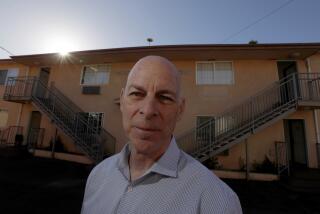MAKING A DIFFERENCE : Helping the Blind: Enlist Teens from Disadvantaged Communities
- Share via
Even groups that are used to helping the community can overlook an opportunity. Before the 1992 civil unrest, the Foundation for the Junior Blind, headquartered near riot-affected areas, had served visually-impaired and multi-disabled blind adults and children throughout the region since 1953 without ever formally hiring local youths to work with its clients. After the unrest, the foundation changed that, partnering with community groups and financial backers to establish a jobs program for local teens from disadvantaged backgrounds called First Steps Youth Enrichment. Less than three months later, 21 teens between the ages of 13 and 18 began working at the foundation’s summer campground in Malibu. Since then, the program has expanded to employ youths during the school year and to offer them weekly mentoring with professionals and academic tutoring with USC students. This year First Steps Youth Enrichment has employed 33 teens at the foundation’s school, dormitories, recreation facilities, campgrounds and offices.
COMMUNITY GROUPS
Groups that have guided and provide recruiting assistance include:
101 Foundation
Brotherhood Crusade
Community Youth Gang Services
Crenshaw and Dorsey high schools
Urban League
National Council of Negro Woman
Los Angeles County Department of Probation
SPONSORS
The Foundation for the Junior Blind’s financial backers include:
First Interstate Bank
Tom and Valley Knudsen Foundation
Pacific Telesis
Safeco Insurance Companies
Muriel Siebert & Company, Inc.
TRW
WHAT ONE TEEN WORKER LEARNED
Donnell Locklin
First Steps employee, senior, 18, Business Industry High School, Los Angeles
People at youth gang prevention services said they knew of a job that would help me to be in an environment other than a rowdy street one.
Before I started working, the relationship between me and some members of my family was going downhill. I was hard-headed. The crowd I hung out with, I let them influence me. If it weren’t for this program I might be running with the wrong crowd. Here I see people caring for others and caring about me the way my mother would. So it changed me in a way so I could see how to care about people rather than be inhumane.
I found out that I shouldn’t fear blind and disabled people; they yearn for attention and companionship just like anyone. Working here, I’m able to provide that.
AN EXPERT’S VIEW OF THE PROGRAM
James Johnson
E. Maynard Adams professor of Geography, Sociology and Business, University of North Carolina at Chapel Hill, Los Angeles resident for 14 years
A program like First Steps is exemplary, to my way of thinking. What’s critical for youth in distressed communities is having access to social resources that help you negotiate the environment, encourage you to pursue mainstream avenues of social and economic activity and discourage you from engaging in dysfunctional behaviors. What you have operating with First Steps--is a set of social organizations working together to link disadvantaged kids with an opportunity. They get some money, have something to do after school or over the summer instead of being idle, work with and enrich the lives of people who are blind or otherwise handicapped. This experience adds meaning to young peoples’ lives who otherwise might not see much meaning where they’re growing up. Programs like this may seem small but they can serve as models for what we need to be doing on a much larger scale in the urban environment.
THE FOUNDATION PERSPECTIVE
Marie Johnson
Director of Social Services, Junior Foundation for the Blind
There are organizations that aren’t willing to bring in kids who may or may not have had gang involvement because they think they’re hard core. There’s a fear so a lot of people don’t want to take a chance. These kids come in with no employment skills. They have to be taught about the work world, how to get along with others, how to deal with our clients, how to dress, how to communicate appropriately.
What happens, though, is that the kids come in, and they have the energy and desire to do well. We didn’t know whether the pairing of these populations was going to work, but it’s really facilitated our Foundation’s mission...and it’s really softened the kids in the First Steps program.
To similar organizations that say (setting up a program like this) is too difficult I’d say come over and see what we’ve done. It doesn’t take a lot of work, and we don’t work alone.
JOB BENEFITS
Gain experience in a routine work environment
Learn about special needs of blind, multi-disabled people
Receive access to beaches, mountains and recreational and outdoor activities like horseback riding, swimming, hiking and golfing through Foundation’s programs
Earn regular wages from $3.60 to $5.25
TO GET INVOLVED
Call the Foundation for the Junior Blind at (213) 295-4555 about support, volunteer or donation opportunities with the First Steps Youth Enrichment program or their other services.


